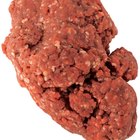
An easy-to-grab meal, bagels first came to America with Jewish immigrants in the late 1800s. The distinctive texture comes from the method of boiling then baking the soft, round bread. Bagels are a portable food, but cream cheese is a dairy item and as such is considered perishable. The Food and Drug Administration cautions against leaving perishable food items unrefrigerated because temperatures above 40 degrees Fahrenheit support the growth of harmful bacteria that cause foodborne illnesses.
Bacteria
In perishable food items such as cream cheese, bacteria begin to grow most rapidly at temperatures above 40 F. Bacteria can double its re-population rate in as little as 20 minutes. The FDA estimates that 6.5 to 33 million illnesses and 9,000 deaths annually are caused by unsafe handling of food.
Salmonella
There are six kinds of bacteria related to food poisoning that cause the most hospitalizations in the U.S. Salmonella tops the list. It thrives in food items such as cream cheese and desserts filled cream cheese fillings that have been left unrefrigerated, and the number of cases of Salmonella in the U.S. has been on the rise since 1992. Symptoms occur six to 48 hours after the contaminated food has been consumed.
When to Throw Away
Unlike mold, the presence of bacteria such as Salmonella cannot be detected by the smell, taste or appearance of food. A bagel with cream cheese that has been sitting out unrefrigerated for more than two hours should be thrown away without tasting. If the air temperature reaches 90 F or hotter, the risk of harmful pathogens occurs after only one hour.
Safe Storing
In order to survive, bacteria need food, moisture and warmth. Refrigerating perishable food items such as cream cheese at or below 40 F prevents the growth of harmful pathogens. Leaving a bagel with cream cheese out at room temperature for more than two hours and then refrigerating it might slow the growth of bacteria, but it will not kill the harmful bacteria that are already present.
Related Articles

FDA Food Storage Temperature Guidelines

Do Boston Cream Pie Cupcakes Need ...

How Long Can Milk Stay Unrefrigerated?

How Long Can You Keep Cooked Chicken ...

Does Cream Cheese Filling Have to Stay ...

Dangers of Spoiled Ground Beef

Serving Size of Dairy Foods

Can You Eat Sour Cream If It's Been ...

What Happens to Cream Cheese if It's ...

The Calories in an Ice Cream Sandwich

Bagel Bites Heating Instructions

What Foods Provide Calcium D-Glucarate?

Does Caviar Go Bad?

How Many Calories Are in a Slice of ...

The Amount of Lactose in Yogurt

What Type of Microorganism Is Used to ...

Does a Sliced American Cheese Product ...

A List of Foods Containing Microbes

How Long Can You Refrigerate Nacho ...
Maximum Storage Temperature of Canned ...
References
Writer Bio
For more than 10 years, Carol Butler has run a small, off-grid furniture business with her husband and is a regular contributor to the Edible community of magazines. As staff writer for RichLife Advisors, she covers financial planning and other industry-related topics. She holds a B.F.A. in theater arts.
Photo Credits
Jupiterimages/liquidlibrary/Getty Images